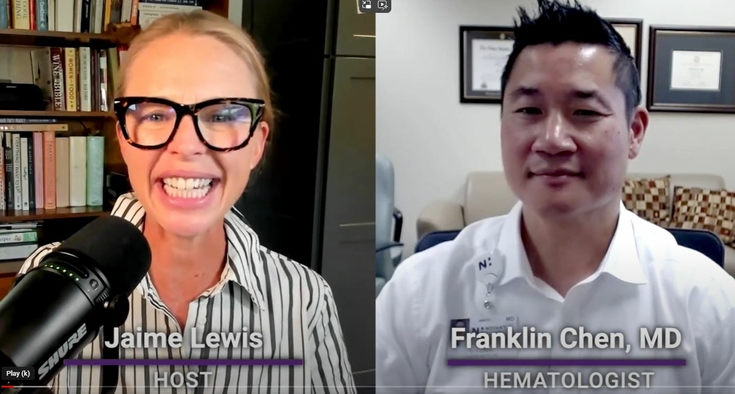Editor’s note: This is one in a series of stories exploring the survivorship journeys of Novant Health Cancer Institute patients. You’ll find all the stories here. We celebrate our survivors and share their stories to showcase how surviving – and thriving – after a cancer diagnosis is possible.
When Tory Overstreet, now 54, started losing weight in the fall of 2016, she thought, “What woman doesn’t want to lose weight? This is great! I don’t know what I’m doing differently, but this is awesome!”
By Christmas, she began to look gaunt, and her sister-in-law remarked about how much weight she had lost. It would be months before the reason was revealed.
Tory’s weight loss was accompanied by a nagging cough that was first treated with various cough medicines by her primary care physician and, soon after, an ear, nose and throat (ENT) physician. When the cough persisted through early March 2017, the ENT ordered a CT scan to explore the root cause. That scan revealed a very large mass in the center of her chest.
“They felt it was cancer but needed to do more testing to determine what type,” Tory said. “I was scheduled for a PET scan, but it was going to be a two-week wait.” The back pain she started to experience – from where the tumor was positioned – quickly became unbearable. She was admitted to the hospital so her doctors could more quickly get the tests they needed.
“Within a day I had the PET scan, and my biopsy revealed it was thymic carcinoma,” she said. “I had my first chemo within a week. It was so fast. Once they knew what it was, they didn’t hesitate at all.” Thymic carcinoma is a rare cancer that forms on the thymus gland, part of the lymphatic system.
Tory, an elementary school teacher with two sons who were 15 and 18 at the time, was relieved to be moving forward. “We knew there was something going on for so long,” she said. “So, in a way, we were just grateful to know we could put a name to what’s wrong and go about fixing it. It was never an option that treatment wasn’t going to work.”
The family lives in Advance, North Carolina, southwest of Winston-Salem. Her oldest son, Cole, was a senior in high school and an Eagle Scout. There was lots of life to live in that time, and Tory found herself in the hospital a lot.
“It was obviously a very emotional time,” her husband, Greg, said. “I like to fix things. And this was way out of my control and beyond anything I could fix. So, for me, it was difficult knowing that we had to put all our trust in other individuals.”
Supportive care throughout your cancer journey
Everything he read pointed to the importance of staying positive. “There was never an option of not being positive and not doing whatever Tory or the boys needed,” he said.
Word quickly spread about Tory’s diagnosis, and the Overstreet family was overwhelmed with support – from their school and neighborhood.
“We were just amazed – and I think, shocked – by the amount of support we had,” Tory said.
Greg added, “Tory has touched so many people in her time at her school, and all of that came back tenfold.”
The Overstreets would rely on that support over the next year as Tory’s cancer continued to spread. “My chemo cocktail to start was pretty wicked,” she said. “They called one ‘The Red Devil.’ I lost all my hair. I wound up in the hospital both times because it made me so sick.”
So, doctors changed her treatment mix to six weeks of chemo with simultaneous radiation. The course lasted through July 2017. That summer, a PET scan revealed the cancer had metastasized to her rib. Doctors surgically removed that tumor.
When a follow-up PET scan revealed spots on her liver, lungs and around her heart, the Overstreets were referred to Duke and later to Georgetown to a specialist conducting thymic carcinoma trials.
“We called my November/December 2017 scan my ‘Christmas tree scan’ because (my cancerous areas) lit up like a tree,” Tory said. “It was bad, but I can laugh about it now.”
At the recommendation of her doctors, she started Keytruda, an immunotherapy drug that, at the time – December 2017 – was only a new trial drug for thymic carcinoma.
“The difference between my two scans after just three months was miraculous,” Tory said. “All the (metastasized) areas had resolved. I had a nodule on my neck the size of a grape, and within two weeks, it was the size of a pea. All the spots on my liver, lungs and ribcage disappeared, and my main tumor went way down. To this day, we marvel at what a great thing it’s been.”
Tory eventually graduated to infusions every six weeks instead of every three. She had some additional proton radiation treatment in 2018 at the recommendation of her doctors, but otherwise has only maintained her Keytruda regimen.
“Now I have days where I don’t even think about cancer,” Tory said, crediting her resilience with the fact that she never considered she might not be around to see her boys grow up.
“It wasn’t an option to not be here. It wasn’t an option to not see my sons graduate or get married, if that happens. It wasn’t something I was going to miss. Between family and friends and strangers pulling for us, it wasn’t an option to not survive.”
Early on, Tory and Greg sought a second opinion. “We ended up at Novant Health,” he said. “That was the best decision I think we made during this whole process. Tory was able to start the immunotherapy and not wait on the trial, which probably saved her life.”
Tory’s sons hadn’t realized how close they had come to losing their mom until well after the fact. “To an extent, we knew it wasn’t good,” said Cole. “We knew Mom was sick; we’d go see her in the hospital. But because our family was always so positive, how big it all was didn’t set in until later.
“It made us all closer and showed how important it is to be a family and do everything we can for each other.”
Tory doesn’t sweat the small stuff as much as she used to. Returning to work as a third-grade teacher was “the sweetest medicine,” she said. “If I’m having a bad day, I tell myself, ‘Look how far you’ve come. Don’t go backward.’ I’m so grateful to be where I am.”
The Overstreets make staying positive in the face of adversity look easy. All four agree it’s a daily practice.
“It’s so hard not to project what you think could happen,” Tory said. “You can quickly go down a rabbit hole of thinking how this could go bad. Try not to. Each day is a new day. Take care of that day. Stay mentally strong. Surround yourself with positive people, and don’t retreat.”









